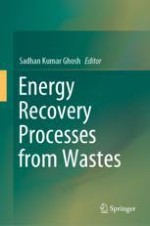2020 | OriginalPaper | Chapter
An Experimental Study on the Generation of Biogas Using Food Waste and Water Hyacinth
Authors : Soundararaj Manju Soniya, J. Senophiyah-Mary
Published in: Energy Recovery Processes from Wastes
Publisher: Springer Singapore
Activate our intelligent search to find suitable subject content or patents.
Select sections of text to find matching patents with Artificial Intelligence. powered by
Select sections of text to find additional relevant content using AI-assisted search. powered by
